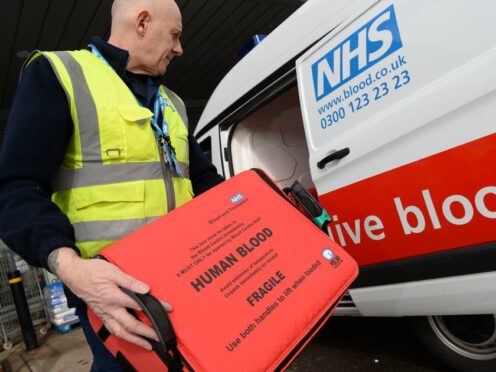
Scientists are to double match blood intended for use for kidney transplant patients in a bid to make sure their donated kidney is less likely to be rejected.
As well as ensuring that blood is matched by type, researchers will also match white blood cells as closely as possible.
If the six-month pilot scheme at Hammersmith Hospital in London is a success then the initiative could be rolled out nationally.
About two in every five kidney transplant patients need blood transfusions before or after transplant.
After transfusion some patients will make antibodies and if these are directed to the newly donated kidney, this can increase chances of organ rejection.
It is hoped that matching white blood cell type – also known as tissue type or HLA type – as closely as possible between the blood donor and the organ transplant patient will mean that the patient should be less likely to reject the “foreign” organ.
NHS Blood and Transplant (NHSBT) will match the blood at a specialist Histocompatibility and Immunogenetics laboratory in Colindale, London, and supply it for selected pre and post-transplant patients at Hammersmith Hospital, part of Imperial College Healthcare NHS Trust.
Dr Colin Brown, NHSBT consultant clinical scientist and head of histocompatibility and immunogenetics at Colindale, said: “In this pilot programme, we are going to HLA-match red blood cell transfusions for renal transplant patients to avoid sensitisation against the donor kidney and so reduce the risk of kidney transplant rejection.
“If renal patients produce HLA antibodies in response to transfusions, this could potentially affect access to transplantation and transplant outcomes. This is an innovative pilot programme, and we hope to improve patient outcomes.
“Each year, around 1,000 kidney patients who are transplanted will also receive a transfusion. If all of them could benefit from a successful transfusion programme and a wider roll-out, our models show 100 kidney transplants a year could be saved.”

Gemma Louis, 44, from Chester-le-Street in Co Durham, has waited 11 years for a kidney transplant because of “sensitisation from a blood transfusion”.
Ms Louis, a civil servant, has chronic kidney disease and needs four hours of dialysis three days a week.
The mother-of-two said: “I was told initially my wait would be twice as long as normal, so around six years. I am 11 years in now.
“I knew I would have a long wait purely because of the antibodies I developed to the transfusion. It’s harder to find a match which won’t be rejected. This programme sounds like it could potentially help people like me in the future.”

Alisha Gorkani, 25, from Sidcup, south London, has juvenile nephronophthisis and has spent seven years waiting for a matching kidney transplant.
She has developed antibodies from a mix of blood transfusions and a past kidney transplant.
A solutions adviser for a tech company, she said: “I have a lot of antibodies so I could be waiting a very long time. I try to make the best of things but waiting for a kidney and being on dialysis is incredibly hard.
“It does give me hope that people like me could have better matched blood in the future. There are thousands of people hoping for a miracle match.”
As of the end of March there were 5,870 people in the UK on the kidney transplant waiting list.

Enjoy the convenience of having The Sunday Post delivered as a digital ePaper straight to your smartphone, tablet or computer.
Subscribe for only £5.49 a month and enjoy all the benefits of the printed paper as a digital replica.
Subscribe